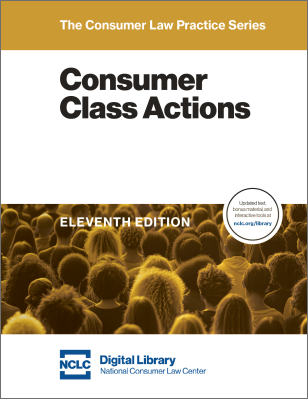In Campbell-Ewald Co. v. Gomez, 2016 WL 228345 (Jan. 20, 2016), the defendant sought to derail a putative TCPA class action by offering the named plaintiff $1503, which was more than he could recover individually. The plaintiff rejected the offer.
Adopting the analysis of four justices who had dissented in Genesis HealthCare Corp. v. Symczyk, 133 S. Ct. 1523 (2013), the Supreme Court in Gomez decided that an unaccepted settlement offer or offer of judgment pursuant to Fed. R. Civ. P. Rule 68 does not moot a plaintiff’s case even if it provides complete relief for the plaintiff. Defense offers of settlement and judgment used to attempt to defeat putative class actions is discussed in greater depth in NCLC’s Consumer Class Actions § 7.3.
The five member majority’s analysis in Gomez was predicated on basic contract principles, finding that an unaccepted offer is of no force and effect. Likewise, the Court ruled that under the explicit terms of Fed. R.Civ.P. 68, an unaccepted Rule 68 Offer of Judgment simply lapses if not accepted within fourteen days. “Absent Gomez's acceptance, Campbell's settlement offer remained only a proposal, binding neither Campbell nor Gomez. … In short, with no settlement offer still operative, the parties remained adverse; both retained the same stake in the litigation they had at the outset.” Gomez. at *7
Justice Thomas, concurring in the judgment only, disagreed that this was the appropriate analysis. He nevertheless joined the judgment on the basis that under the historic law of tenders, a mere unaccepted offer was insufficient to deprive the court of Article III jurisdiction. (Concurrence at p.6)
Justice Thomas noted that in state and federal courts, a tender must be for complete relief, and was deemed “an admission of a liability” on the cause of action to which the tender related, so any would-be defendant who tried to deny liability could not effectuate a tender. (Concurrence at p.2) However, he also responded with the following statement to the three dissenters view that an unaccepted offer can moot a controversy: "THE CHIEF JUSTICE also contends that our precedents ‘plainly establish that an admission of liability is not required for a case to be moot under Article III.’ Post, at 10, n. 3. But we need not decide today whether compliance with every common-law formality would be necessary to end a case. The dispositive point is that state and federal courts have not considered a mere offer, without more, sufficient to moot the case." (Concurrence p.6)
For class action practitioners, it is important to note that the majority also observed that “[w]hile a class lacks independent status until certified, a would-be class representative with a live claim of her own must be accorded a fair opportunity to show that certification is warranted.” Gomez at 11. They rejected the dissent’s contrary view, noting that it “would place the defendant in the driver’s seat” of the civil justice system. Id.
What Comes Next
While a very important victory for the viability of class actions, the opinion leaves the door open for a different defense maneuver that may or may not be problematic in the future. The Court stated: “We need not, and do not, now decide whether the result would be different if a defendant deposits the full amount of the plaintiff ’s individual claim in an account payable to the plaintiff, and the court then enters judgment for the plaintiff in that amount. That question is appropriately reserved for a case in which it is not a hypothetical.”
A defendant can easily make such a deposit, and would presumably then move to have a judgment for plaintiff entered. But no Rule authorizes such a motion for involuntary judgment in favor of the plaintiff. Rule 68 permits such an entry of judgment for plaintiff without a finding of liability, but as the Court in Gomez notes, Rule 68 is not applicable when the time to accept the offer has lapsed.
Moreover, whether a court will enter judgment for the plaintiff without the defendant admitting liability remains to be seen. As discussed by Justice Thomas, at common law a tender to satisfy the plaintiff’s claim was valid only if it included an admission of liability. See the discussion of Justice Thomas’ concurring opinion, supra. And very few defendants will admit to liability when persons in an uncertified class could then use collateral estoppel to win their own cases.


